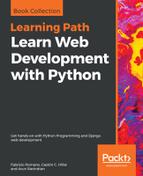According to the Python documentation (https://docs.python.org/3/glossary.html), an iterable is:
An object capable of returning its members one at a time. Examples of iterables include all sequence types (such as list, str, and tuple) and some non-sequence types like dict, file objects, and objects of any classes you define with an __iter__() or __getitem__() method. Iterables can be used in a for loop and in many other places where a sequence is needed (zip(), map(), ...). When an iterable object is passed as an argument to the built-in function iter(), it returns an iterator for the object. This iterator is good for one pass over the set of values. When using iterables, it is usually not necessary to call iter() or deal with iterator objects yourself. The for statement does that automatically for you, creating a temporary unnamed variable to hold the iterator for the duration of the loop.
Simply put, what happens when you write for k in sequence: ... body ..., is that the for loop asks sequence for the next element, it gets something back, it calls that something k, and then executes its body. Then, once again, the for loop asks sequence for the next element, it calls it k again, and executes the body again, and so on and so forth, until the sequence is exhausted. Empty sequences will result in zero executions of the body.
Some data structures, when iterated over, produce their elements in order, such as lists, tuples, and strings, while some others don't, such as sets and dictionaries (prior to Python 3.6). Python gives us the ability to iterate over iterables, using a type of object called an iterator.
According to the official documentation (https://docs.python.org/3/glossary.html), an iterator is:
An object representing a stream of data. Repeated calls to the iterator's __next__() method (or passing it to the built-in function next()) return successive items in the stream. When no more data are available a StopIteration exception is raised instead. At this point, the iterator object is exhausted and any further calls to its __next__() method just raise StopIteration again. Iterators are required to have an __iter__() method that returns the iterator object itself so every iterator is also iterable and may be used in most places where other iterables are accepted. One notable exception is code which attempts multiple iteration passes. A container object (such as a list) produces a fresh new iterator each time you pass it to the iter() function or use it in a for loop. Attempting this with an iterator will just return the same exhausted iterator object used in the previous iteration pass, making it appear like an empty container.
Don't worry if you don't fully understand all the preceding legalese, you will in due time. I put it here as a handy reference for the future.
In practice, the whole iterable/iterator mechanism is somewhat hidden behind the code. Unless you need to code your own iterable or iterator for some reason, you won't have to worry about this too much. But it's very important to understand how Python handles this key aspect of control flow because it will shape the way you will write your code.
